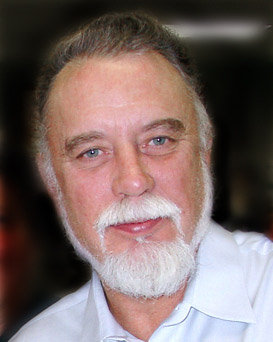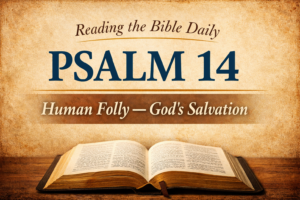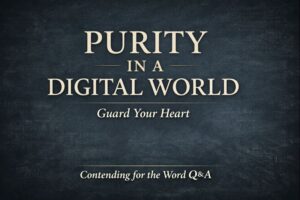⏱️ Estimated Reading Time: 9 min read
Psalm 82 Explained: What It Really Teaches
By Don Veinot • September 6, 2025
In the book, Practically Radical, American writer, speaker, and entrepreneur William C. Taylor seems to have coined the phrase, “Just because you can doesn’t mean you should.” This has applications in several areas, even including biblical translation and interpretation. We addressed this last week in “How Many True Gods Are There?” regarding the Watchtower Bible and Tract Society’s “translation” of John 1:1 and the late Michael Hesier’s assertion that Psalm 82 teaches that God is part of a pantheon of gods:
The God of the Old Testament was part of an assembly—a pantheon—of other gods.1
Could this passage be translated in this way? A professor of Hebrew I know believes it can be, and he is right, it can. But should it? In order to read it his way, the reader would have to ignore the immediate context of the passage and the overall biblical context of Scripture regarding the nature of God as it is revealed. The late Michael Heiser seems to do just that by translating all of Psalm 82 through the grid of how he translates verse one. We will look at this in three translations. In the KJV the first verse reads:
God standeth in the congregation of the mighty; he judgeth among the gods.
In the Orthodox Jewish Bible, it reads:
Elohim standeth in the Adat El; He judgeth among the Elohim2
In the ESV it is translated:
God has taken his place in the divine council; in the midst of the gods he holds judgment
We can clearly see in the Orthodox Jewish Bible that Elohim occurs twice in verse one. In the first occurrence, it refers to the one true God. In the KJV and the ESV, it is translated “gods” in the second occurrence, which is one of the possible ways it could be translated. But just because it can be translated god, should it be? In the case of the late Dr. Michael Heiser, by translating it this way, he “discovered” that YHWH (God) is one in a pantheon of gods. As we mentioned in “How Many True Gods Are There?,” David Stern notes that:
the Hebrew text of Psalm 82 the word “elohim” may be translated “God,” “gods,” “judges” or “angels.”3
How do we move from how it can be translated to how it should be translated? We would suggest that we need to consider the overall context of the Bible as well as its immediate literary context. The description of those that YHWH is judging is:
“How long will you judge unjustly and show partiality to the wicked? Selah Give justice to the weak and the fatherless; maintain the right of the afflicted and the destitute. Rescue the weak and the needy; deliver them from the hand of the wicked.” They have neither knowledge nor understanding, they walk about in darkness; all the foundations of the earth are shaken. (Psalm 82:2-5)
We contacted three Hebrew scholars and asked a simple question:
Is there anywhere in Scripture where we find angels, other gods, etc, tasked with these things, or is it only human rulers and/or human judges? I haven’t found any, and it would seem that the unjust judges in this passage are human and not deities or angels. Please let me know what you think when you have time.
Dr. Thomas Howe and Dr. Wave Nunnally both responded by email, and I spoke with Dr. David Brewer by phone. Brewer could not think of any passage that assigns the task of judging, giving justice to the weak and the fatherless; maintaining the right of the afflicted and the destitute, rescuing the weak and the needy, and delivering them from the hand of the wicked to other gods, a pantheon of gods or angels. Dr. Thomas Howe’s email response is helpful:
I am not aware of anywhere these tasks are given to angels or “other gods,” nor am I aware of any passage in which the text states that these tasks are given only to humans. Simply because there is no other place where these tasks are given to angels or “other gods” does not mean that Ps. 82 cannot be the one place where they are given this task. Just because a statement is made only once in the Bible doesn’t mean that this necessarily precludes a given interpretation. The burden of proof lies with those who argue that Ps 82 is referring to angels or “other gods.” There is good reason for understanding the word elohim to refer to the judges. Exodus 22:9 refers to the judges as elohim. In my book The Unseemly Realm, I deal with Heiser’s interpretation of Jesus’ statement in John 10 about calling the judges “gods.” Jesus actually refers to Ps. 82 in John 10.4
In other words, we don’t know of any other instances in the Bible of angels or “other gods” being given the task of judging the Nation of Israel (or any other nations or humans), but the absence of evidence is not evidence of absence, so that doesn’t mean it cannot be translated as Michael Heiser and others have. However, “The burden of proof lies with those who argue that Psalm 82 is referring to angels or ‘other gods,’ and aside from his assertion, Heiser does not provide that proof.
Part of Dr. Nunnally’s response is:
I agree with your assessment 1000%, Don. The semantic range of biblical words can be given to us by bible dictionaries, theological wordbooks, concordances, and lexicons. However, it is the “Immediate Literary Context’ part of hermeneutics that allows us to rule out meanings that might be appropriate elsewhere but simply don’t fit in the passage in question because clues within that immediate literary context rule those other nuances out. This process then narrows down the possibilities, usually, to just one possible nuance/meaning/translation. What you pointed out about the challenge to judge and bring deliverance to those being oppressed by earthly judges who don’t have their best interests in mind…does precisely that.
So, it is here that the Heiserian Hypothesis and consequent rereading of biblical texts like Psalm 82 just falls apart. Context rules! Then the principle of the “Full counsel” of God comes in and devastates whatever is left of any possibility that the Heiserian Hypothesis could hold true by showing that there are NO other passages that attribute these attributes and responsibilities to anyone other than humans. At this point, the only recourse Heiser has is to fall back on his now-failed Hypothesis—to say that these are indeed gods, and that Yahweh is calling on them to do what they are supposed to do. This, however, is what is called a circular argument5
It would seem that if we consider the overall context of the Bible regarding YHWH as the one true God and focus on the context of the passage itself, we should affirm the traditional view that the ones YHWH is judging are unjust human leaders or judges. There is one other point of evidence in the passage:
I said, “You are gods, sons of the Most High, all of you; nevertheless, like men you shall die, and fall like any prince.” (Psalm 82:6-7)
Howe points out that if these are spirits, i.e., gods or angels, rather than men, they cannot die, much less die like men:
The only way spirit beings can lose their immortality is if they are completely annihilated by God so that they cease to exist. But ceasing to exist is not what happens to men when they die. Since the text states that these beings will die like men, they cannot be spirit beings or supernatural beings. They must necessarily be mortals. This is yet another instance of Heiser’s practice of eisegesis, and, as Heiser said, “the wording is important.”6
Some may ask if “You are gods, sons of the Most High” in Psalm 82:6 argues against human judges? Howe addresses this as well:
Heiser claims that the phrase “sons of God” is used in the Hebrew Bible only of non–human beings. This is true only if someone accepts Heiser’s interpretation of certain passages. For example, Heiser argues that the “sons of God” in Gen. 6:2, 4 are in fact angels, and since, as we have shown, spirit beings cannot die, then the “sons of God” in Psalm 82 cannot be spirit beings. They must be human beings. So, Heiser is simply wrong that the phrase “sons of God” applies only to spirit beings.
Heiser’s interpretation is in fact a step down from the “mortal view.” Since Heiser argues that the “other gods” or other “divine beings” were created by YHWH, then basically Heiser has Jesus claiming to be one of these other “divine beings,” hence, a created god. Heiser attempts to avoid this conclusion by saying that Jesus is connecting Himself to the council as co–regent with God. However, this move does not work. In His prayer in John 17, Jesus said, “I do not ask on behalf of these alone, but for those also who believe in Me through their word; that they may all be one; even as You, Father, are in Me and I in You, that they also may be in Us, so that the world may believe that You sent Me. The glory which You have given Me I have given to them, that they may be one, just as We are one; (Jn. 17:20–22). Jesus’ statement in Jn. 10:34 is not about claiming to be co–regent in some divine council. Jesus is claiming to be God, which is why the Jews seek to stone Him. In fact, Heiser’s interpretation robs Jesus’ statement of any sense.7
Heiser makes some good points in some areas, but the problems surface in Heiser’s hermeneutics. In “The Unbiblical Realm, Refuting the Divine Council of Michael Heiser’s Deuteronomy 32 Worldview,” Pastor Gary Gilley writes:
Heiser’s primary flaw is hermeneutical. As Henning summarizes, “Michael Heiser has constructed a complex conundrum that is based on mythologizing the Bible, ignoring or alerting the grammar of Scripture, allegorizing, and interpreting God’s Word by a faulty worldview which he admits to having produced based on pagan myths”
But the Apostle Paul warns the young pastor Timothy not “to devote themselves to myths and endless genealogies, which promote speculations rather than the stewardship from God that is by faith.” (1 Timothy 1:4)
This article was first published at Midwest Christian Outreach and is posted here with permission.
For more from Contending for the Word visit our page here at Servants of Grace or our YouTube.
Don Veinot and his wife are co-founders and president of Midwest Christian Outreach, Inc. (MCOI), a mission to cults and non-Christian religions based in Wonder Lake, IL. Don and Joy (his wife since 1970) have been involved in discernment ministry as missionaries to New Religious Movements since 1987. Don is a frequent guest on numerous radio and television broadcasts including The John Ankerberg Show as well as being a staff researcher and writer for the Midwest Christian Outreach, Inc. Journal. Additionally, Don is co-author of A Matter of Basic Principles: Bill Gothard and the Christian Life, Richard Rohr and the Enneagram Secret, A Matter of Basic Principles: Bill Gothard and His Cultish Teachings as well as contributing author of Preserving Evangelical Unity: Welcoming Diversity in Non-Essentials. Furthermore, he is the author of various research articles in the CRI Journal, PFO Quarterly Journal, Campus Life Magazine, Journal of the International Society of Christian Apologetics, Midwestern Journal of Theology, and other periodicals. Don was ordained to the ministry by West Suburban Community Church of Lombard, IL, at the Garden of Gethsemane in Jerusalem, Israel, in March of 1997. He is a charter member of the International Society of Christian Apologetics (ISCA) and is also the current President of Evangelical Ministries to New Religions (EMNR), a consortium of counter-cult/apologetic and discernment ministries from around the country. In addition, Don co-hosts a weekly webcast with Ron Henzel, Senior Researcher for MCOI, called “The Unknown Webcast,” which can be found on their YouTube channel at www.youtube.com/c/MidwestoutreachOrg.




